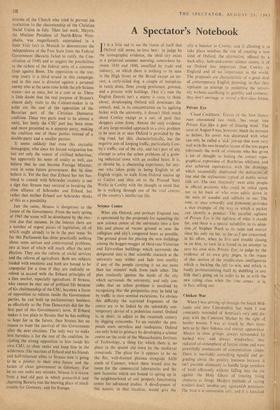Science Centre
What ails Oxford, and perhaps England too, is epitomised by the proposals for squeezing the new science centre of the university into a few bits and pieces of vacant ground as near the collegiate and city's congested heart as possible. The ground given for placing the new buildings among the hugger-mugger of third-rate Victorian and Edwardian buildings which surrounds the designated sites is that scientific research at the university may wither and fade into sterility if any of the people carrying it on are more than ten minutes' walk from each other. The plan resolutely ignores the needs of the city which surrounds the university, and only con- cedes that an urban problem is involved by recognising that the peripatetics may be held up by traffic in their seminal excursions. To obviate this difficulty the scattered fragments of the centre are to be linked by the splendidly con- temporary device of a pedestrian tunnel. Oxford is, in short, to adjust to the twentieth century by 'digging catacombs. To an outsider the pro- posals seem nerveless and inadequate. Oxford can only hold its primacy by developing a science centre on the scale of the Massachusetts Institute of Technology, a thing for which there is no place in the quaint old town by the mediaeval crossroads. The place for it appears to be on the flat, well-drained plateau alongside A420 south of Cumnor, where there would also be room for the commercial laboratories and the new factories which are bound to spring up in the neighbourhood of any properly functioning centre for advanced studies. A development of this nature, in that location, would give the city a balance to Cowley. and if allowing it to take place involves the risk of creating a new kind of Oxford, the alternative, offered by a back-alley, hole-and-corner science centre, is of an Oxford less important than Cowley in England and of no importance. in the world. The proposals are characteristic of a great deal of contemporary English planning, in that they represent an attempt to modernise the univer- sity without sacrificing its gentility and cosiness: they don't envisage or intend a first-class future.






























 Previous page
Previous page